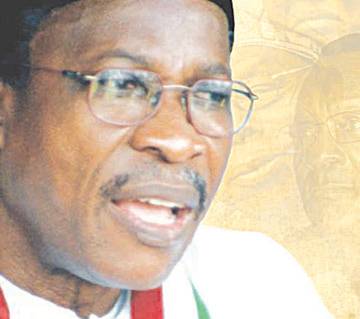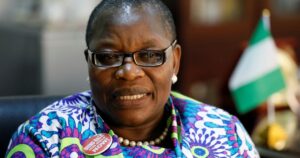On the same day he was supposed to mark his 80th birthday, erstwhile General Secretary of the Nigeria Union of Petroleum and Natural Gas Workers, Chief Frank Kokori, died.
Kokori, one of the staunchest NADECO activists, died of kidney-related ailment in the early hours of Thursday at a private hospital in Warri, Delta State.
Kokori’s Personal Assistant, Atawada Oke, disclosed the passage of the veteran labour leader to journalists early Thursday, noting that his health relapsed on Monday when he was unable to interact with people around him while he was placed on life support.
Kokori, before his death, made a distress call from his hospital bed over his health status, lamenting that he had been neglected and abandoned to die in spite of his huge contribution to the democratic growth of the country.
Consequently, dignitaries including Delta State Governor, Sheriff Oborevwori; former Deputy President of the Senate, Senator Ovie Omo-Agege; officials of NUPENG among others visited him.
Kokori emerged as a pivotal figure in the struggle for the validation of the annulled June 12, 1993, presidential election won by late Chief Moshood Abiola.
Military junta, Ibrahim Babangida, annulled the results, causing outrage and protests across the country.
Kokori was involved in mobilising the masses against the annulment.
He led NUPENG and the Petroleum and Natural Gas Senior Staff Association of Nigeria (PENGASSAN) in organising nationwide strikes that crippled the oil industry, the country’s economic lifeblood.
The strikes served as a powerful weapon against the military regime, putting significant pressure on Babangida to reverse his decision.
In addition to leading the oil workers’ strikes, Kokori was actively involved in pro-democracy activities.
He participated in various rallies and demonstrations, calling for the enthronement of democracy and the recognition of Abiola’s victory.
He also played a crucial role in building alliances with other pro-democracy groups and individuals, fostering unity and a common front against the military regime.
As a result of his relentless activism, Kokori was arrested and detained by the military government, enduring imprisonment and torture.
Despite the hardships he faced, Kokori remained undeterred, continuing to advocate for democracy and the ideals he believed in.
His unwavering commitment and courageous actions earned him widespread respect and admiration, solidifying his status as a hero in the fight for Justice.










More Stories
Niger Govt confirms 151 dead bodies recovered after torrential rain swept away 265 houses
Menstrual Hygiene Day: CEE-HOPE tasks FG on free sanitary pads to correctional centres, IDP camps, public schools
Police repel herdsmen attack on students writing WAEC in Benue